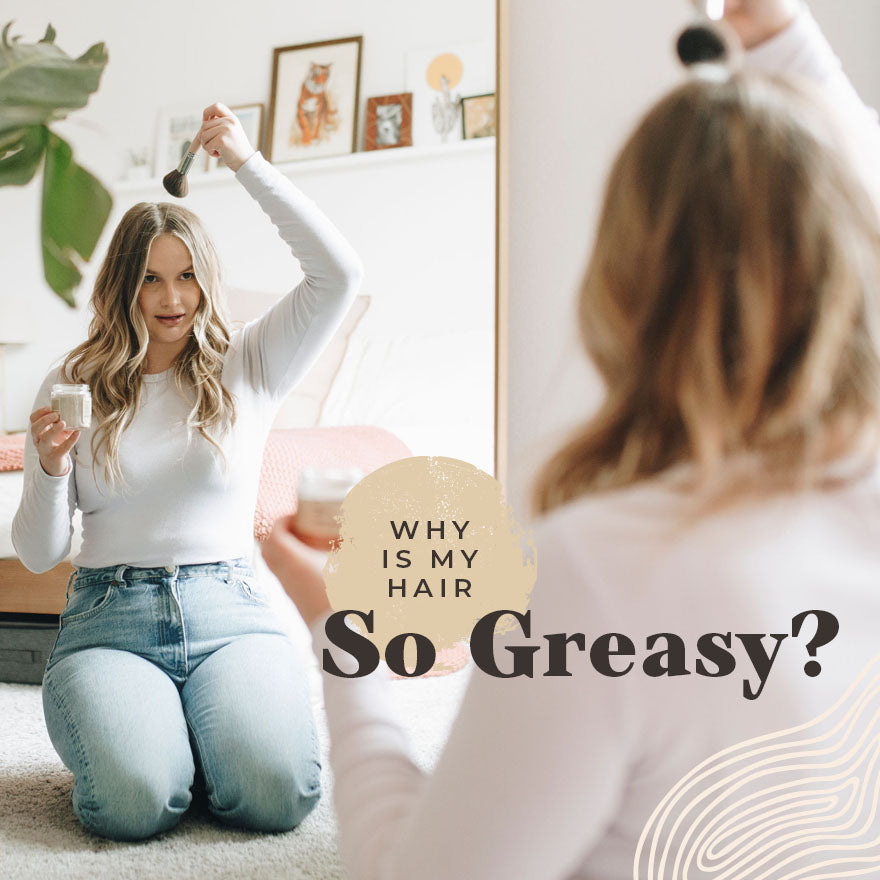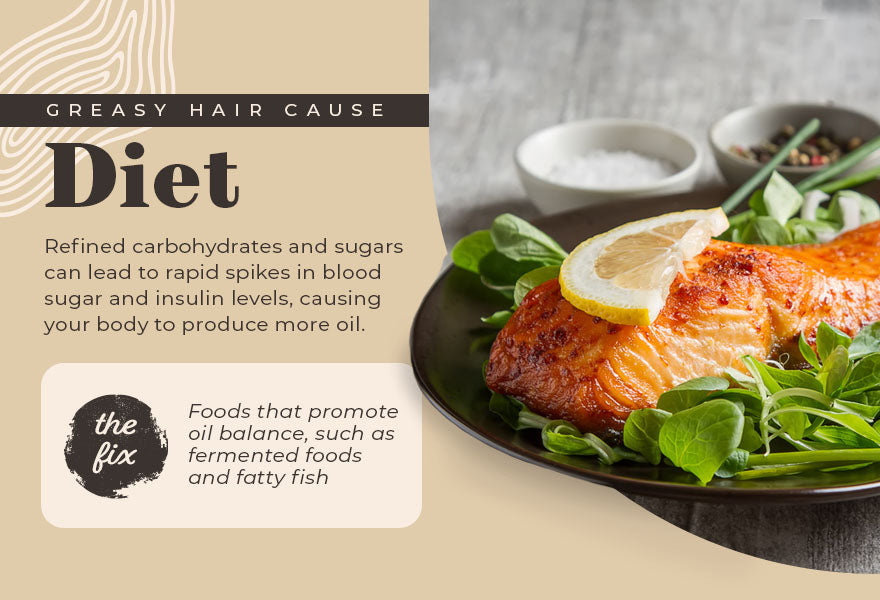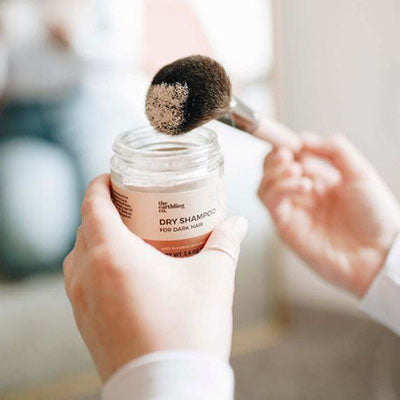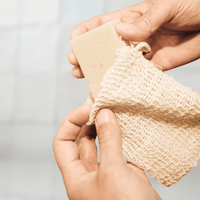
If you’ve ever looked in the mirror and wondered, “Why is my hair so greasy today?” you’re not alone. Limp, oily strands are an all-too-common beauty affliction, and it can happen for many different reasons. Maybe you unconsciously touch your hair throughout the day out of habit. Or maybe all that extra shampooing you’ve been doing lately is sending your oil-producing glands into overdrive, making your hair appear even more greasy than usual (dry shampoo powder to the rescue!).
Although having greasy hair can be frustrating, it is totally normal. We know that when hair is greasy, it can be harder to style, which is why we recommend using dry shampoo. So, to help you banish oily locks for good, here are some possible causes of greasy hair and a few tried-and-true approaches you can take to correct the problem.
What Causes Greasy Hair?
Perhaps the more appropriate question is what doesn’t cause greasy hair. All joking aside, there is a fairly long list of things that can potentially contribute to overly slick strands — from an unhealthy diet and out-of-control hormones to an overzealous washing routine. Here are some of the more likely culprits and their potential fixes.
Uncontrolled Stress
Have you ever noticed how your greasy hair is often at its worst during periods of high stress? Well, there’s a reason for that. When you’re stressed out, your body releases certain hormones that trigger the oil-producing glands located on the scalp and elsewhere on the body, resulting in an overabundance of oil at the roots and a face full of pimples for good measure. (Because greasy hair by itself isn’t frustrating enough to deal with, apparently.)
The Fix: If you think your greasy hair is due to stress, try setting aside some time in the day to wind down and relax. Something as simple as taking a hot bath or practicing deep breathing techniques can go a long way in relieving tension you didn’t even know you had. Also, get regular exercise! Physical exercise is an excellent stress-buster and beneficial for both your body and mind.

Diet
Certain foods can also send your oil glands into overdrive, contributing to the extra shine on your head. For example, refined carbohydrates such as white bread, breakfast cereals and sugary drinks can lead to rapid spikes in blood sugar and insulin levels, causing your body to produce more oil.
Other foods that may contribute to greasy hair include:
- Red meat
- Dairy products
- Salty foods
- Vegetable oils
- Refined carbohydrates (white rice, white bread, pasta, etc.)
- Alcohol
The Fix: Avoiding foods that are known to disrupt blood sugar levels may help curb your scalp’s oil production. You can also load your plate with foods that promote oil balance, such as fermented foods like yogurt and kimchi and fatty fish like salmon and halibut.
Washing Too Little
There's a reason why many hair enthusiasts no longer subscribe to the philosophy that you must wash your hair every day. Going overboard with your washing schedule can strip your strands of their natural oils, leaving you with dry, brittle hair.
But not washing your hair often enough has consequences of its own. If you go too long without shampooing your hair, it can cause oil and bacteria to build up on the scalp, resulting in a greasy, lifeless ’do and an itchy, flaky scalp. Worse still, the product buildup in your hair could negatively affect hair growth and cause you to experience thinning hair.
The Fix: Get on a regular hair-washing schedule to ensure you don’t go too long without lathering up. If you have a buildup of product or sweat on the scalp, consider giving your scalp a deep cleaning with a DIY clarifying shampoo.

Washing Too Much
As unfair as it may seem, washing your hair too much can also cause your hair and scalp to become overly greasy. Washing your hair too much — particularly with harsh surfactants like sodium lauryl sulfate — strips your skin of its natural oils and doesn’t give the scalp enough time between washes to produce more. As a result, your oil glands kick into overdrive, producing more oil to compensate for the lack of moisture. Frustratingly, this can leave you with an even greasier scalp than when you started.
The Fix: Switch to a gentler shampoo — like a plant-based shampoo bar. Compared to conventional shampoos that often use harsh, oil-stripping ingredients, our shampoo bars contain naturally-derived ingredients that gently remove buildup and promote a healthy, balanced scalp.
You can also do your hair and scalp a solid by spacing out the time between washes. If you’re worried about your hair getting greasy in between washes, consider using our dry shampoo powder to soak up the excess oil and give your hair a quick refresh.
Shop Dry Shampoo PowderGenetics/Hair Type
“Why is my hair so greasy?” is a frequently asked question among those with pin-straight locks and fine strands. Why? Well, straight hair doesn’t have any texture to it (waves, kinks, curls, etc.), which means the oil slides down the hair shaft and accumulates on the scalp. Fine hair types are in a similar boat. Their locks tend to get overly greasy quickly because they have more individual strands and, therefore, more oil-producing glands.
Put another way, your greasy mane may just come down to genetics.
The Fix: Unfortunately, you’re stuck with the skin and hair type you were born with (thanks, Mom and Dad). But fear not — we have plenty of expert tips for naturally oily-haired folks just like yourself. For more advice on how to fix greasy hair, skip ahead to “Additional Tips to Combat Greasy Hair” further down.
Seborrheic Dermatitis
Chronically greasy hair may also be due to seborrheic dermatitis, a common, non-contagious skin condition that mainly affects the scalp. In addition to an oily scalp, people with seborrheic dermatitis often have some (or all) of the following symptoms:
- Itchy white flakes on the scalp (dandruff)
- Pinkish plaques of scales on the sides of the face
- Scaly redness on the edges of the eyelids
- Red scales on the skin
- Greasy, oily areas of skin
- Itching
Researchers still aren’t sure what causes seborrheic dermatitis. Some say it’s caused by a combination of factors, such as increased oil gland activity, yeasts called Malassezia and plain old genetics.
The Fix: For this particular hair problem, it’s best to talk to your doctor. They’ll likely prescribe you prescription products (usually antifungals and calcineurin inhibitors) to reduce the visible signs of seborrheic dermatitis and help with the itching and redness.
Silicone-Based Products
Silicones, the ingredients that provide hair with slip and shine, are one of the sneakier causes of greasy locks. These plasticky polymers are commonly found in “moisturizing” products such as conditioners and smoothing creams. One of the problems with silicones (and trust us, there are many) is that they don’t wash out of your hair easily, leaving your mane with a greasy feel.
The Fix: Steer clear of silicones and choose naturally-hydrating products instead. If you want to avoid silicones without depriving your hair of much-needed hydration, check out our silicone-free conditioner bars. They’re chock-full of plant-based ingredients that hydrate hair naturally without weighing it down!
Frequently Touching Your Hair
Just like how touching your face can make you break out, fiddling with your hair can reap repercussions on your hair. When you touch your hair — be it from boredom, nervousness or flirtation — the oils in your hands transfer over to your mane, making it even greasier.
The Fix: Try your best to avoid stroking, twirling, smoothing and otherwise touching your strands. And if you have a significant other, you might want to clue them in on the no-touching-the-hair rule as well!
Is Greasy Hair a Problem?
Although you may not appreciate your hair’s slick appearance, having greasy hair isn’t necessarily a bad thing. Sebum, the oily substance produced by our skin’s sebaceous glands, is packed with fatty acids, sugars, waxes and other natural chemicals that moisturize and protect our hair. It’s the overproduction of sebum that can cause issues, making hair greasy, limp and difficult to style.
When your sebaceous glands produce too much sebum, the excess oil can build up on your scalp, causing irritation and inflammation. If left untreated, this may lead to itching, redness, dandruff and even hair loss.
Additionally, greasy hair can be a sign of an underlying problem, such as a hormonal imbalance. If you find yourself asking, “Why is my hair so greasy all of a sudden?” or oily hair isn’t the norm for you, it may not hurt to make an appointment with your doctor to get to the bottom of the issue.

Additional Tips to Combat Greasy Hair
- Condition with care. When applying conditioner, take care to avoid the roots. They’re already getting plenty of moisture from your scalp’s natural oils. Instead, focus your attention on the ends of your hair, which are more prone to dryness.
- Skip the heat tools. Curling irons, hair straighteners and other heat tools can make hair look greasy faster. For a less slick appearance, try rocking your natural look more often. (Pro tip: Want to make the transition to your natural hair texture easier? Switch to our plastic-free shampoo and conditioner bars, which contain clean, nourishing ingredients that work wonders on all hair types.)
- Clean your styling tools regularly. Keep your brushes, combs and heat styling tools clean. Otherwise, the oils that accumulate on your tools may transfer over to your hair.
- Rinse thoroughly. If product is left in your hair, it can build up on the scalp and make hair look greasy. Make sure you’re getting all of the product out by giving yourself a thorough yet gentle cleaning.
- Try an apple cider vinegar rinse. If the buildup in your hair is particularly stubborn, you may need to “reset” your scalp with an apple cider vinegar rinse. To eliminate unwanted residue, combine one part apple cider vinegar with one part water and pour the mixture directly onto the roots of your hair. Allow the mixture to sit for a couple of minutes before rinsing.
- Apply an aloe hair and scalp mask. Aloe vera isn’t just for sunburns — it’s also a powerhouse ingredient for DIY hair and scalp masks. According to Medical News Today, aloe vera has antimicrobial and antibacterial properties, making it particularly beneficial for people with oily hair. Aloe vera is super effective at removing excess oil and product buildup on the scalp. It’s also rich in vitamins and minerals for your hair.
- Hydrate with lightweight oils. All hair types need hydration, and oily hair is no exception. To hydrate your oily strands without making the problem worse, look for products containing lightweight oils, such as jojoba oil. Not only is jojoba oil rich in antioxidants like vitamin E, but it’s one of the few readily available oils that closely mimic human sebum.
- Choose the right dry shampoo. With its ability to absorb unwanted hair grease and refresh limp strands, dry shampoo is a must-have in any oily-haired person’s haircare arsenal. However, not all dry shampoo products are created equal. Some contain silicones that weigh hair down or harsh alcohols that dry out the scalp, spurring your body to produce extra oils to compensate. To refresh oily hair without making the problem worse, choose a natural dry shampoo with gentle, nourishing ingredients — like arrowroot and bamboo powder. Our natural dry shampoo contains scalp-friendly ingredients and is available in two colors — light and dark — to blend in with your natural hair color.
Say Goodbye to Grease
Nothing ruins a good day like waking up to slick, greasy-looking hair. Whether it’s caused by infrequent hair washing, a poor diet or silicone-based haircare products, oily strands remain a frustrating culprit of bad hair days for many. The good news? There are plenty of ways to stop the grease, from overhauling your haircare products to making a few simple life changes. Follow the tips above and you’ll get back to a grease-free state eventually.
Image Credits
MF production/Shutterstock.com
Vodoleyka/Shutterstock.com
Gaus Alex/Shutterstock.com








